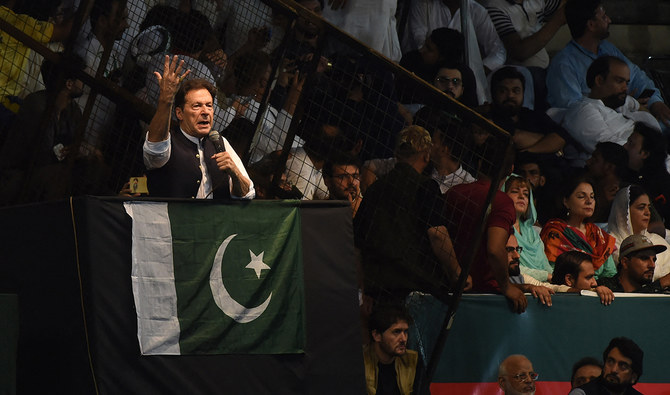ISLAMABAD: The federal government has decided to file a high treason case against former Prime Minister Imran Khan and pursue a case to ban his Pakistan Tehreek-e-Insaf (PTI), Information Minister Attaullah Tarar said on Monday, unleashing a new challenge for the embattled party and its jailed leader.
The government’s decision comes days after the Supreme Court ruled that Khan’s party was eligible for over 20 extra reserved seats in parliament, ramping up pressure on the weak coalition government of Prime Minister Shehbaz Sharif. Adding to the government’s worries are recent favorable court rulings against Khan and the PTI.
Among four cases in which Khan was convicted and has been jailed since August last year, two have been suspended by courts and he has been acquitted in the others, though new cases have since been brought against him. Arguably Pakistan’s most popular politician, Khan says all cases against him are motivated to keep him out of politics and behind bars.
“The government has decided to pursue a case to ban PTI,” Tarar said at a press conference on Monday.
“Under Article 17 of the Constitution, which relates to banning political parties and grants power to the federal government in this regard, this issue will be sent to the Supreme Court ... We believe there is credible evidence for banning PTI due to foreign funding, the May 9 attacks, and the cipher episode.”
Tarar was referring, respectively, to cases related to the PTI receiving millions of dollars in illegal funds from foreign countries, riots last May by alleged supporters of Khan in which government and military buildings were damaged and accusations that the ex-premier leaked state secrets. He also said Khan had tried to sabotage a $7 billion bailout deal with the IMF, which was approved last week.
“PTI and Pakistan cannot co-exist,” Tarar added, saying the government would also file high treason cases against Khan and his close aide Dr. Arif Alvi, who was appointed president by him, under Article 6, which relates to high treason.
Responding to the government’s press conference, the PTI called all cases against the party and Khan as being “politically motivated.”
“This is a sign of panic as they [federal government] have realized the courts can’t be threatened and put under pressure,” senior PTI leader Sayed Zulfikar Abbas Bukhari said in a statement shared with reporters. “I have been saying for a while now that we are under a soft martial law and this move only proves our point further.”
NEW CHALLENGES
All PTI candidates contested the Feb. 8 elections as independents after the party was barred from the polls on the technical grounds that it did not hold genuine intra-party polls, which is a legal requirement. Subsequently, they won the most seats in the national election, 93, but the election commission said independents were ineligible for their share of 70 reserved seats — 60 for women, 10 for non-Muslims — distributed among political parties in proportion to the number of seats they win in general polls. This completes the National Assembly’s total strength of 336 seats.
The reserved seats were then distributed among other parties, mostly those in the ruling coalition, a decision Khan’s party appealed. On Friday the Supreme Court ruled that the PTI was indeed a political party for the purposes of the election and entitled to reserved seats.
In his press conference, Tarar announced the government would file a review against the Supreme Court’s judgment in the reserved seats case.
The government’s latest announcements come amid a spate of new challenges for Khan and his party.
Last week, Khan and his third wife Bushra Khan were acquitted on charges their 2018 marriage broke Islamic law but the National Accountability Bureau (NAB) immediately filed a new corruption case against them, providing fresh grounds for keeping them in jail. Earlier this month, a lower court also dismissed bail pleas by Khan in three cases involving the May 9 riots last year and declared there was “reasonable” evidence to connect him to the violence.
PM Sharif formed a weak coalition with other parties after the Feb. 8 elections produced a hung parliament.
Sharif’s PML-N party’s 79 and the PPP’s 54 seats together made a simple majority in parliament to form a government at the center and also roped in smaller parties in the coalition.
Khan’s convictions had ruled the 71-year-old out of the elections as convicted felons cannot run for public office under Pakistani law. The PTI has rejected the polls’ results, saying they were rigged, a charge the election commission denies.

















